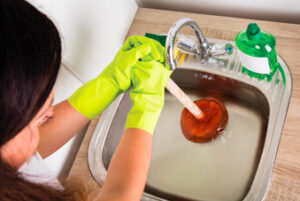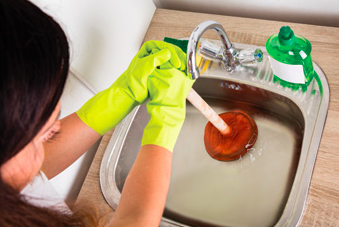 A clogged drain is frustrating and can lead to water damage. The best way to avoid a costly drain clog is to use preventative measures. Clogged drains typically form over time as foods, hair, soap scum and other waste stick to the inside of pipes. Knowing what can cause a clog can help homeowners identify the problem sooner and fix it before it becomes worse. With the help of the plumbers at https://www.plumbing-express.com/ you can be sure the work is done properly.
A clogged drain is frustrating and can lead to water damage. The best way to avoid a costly drain clog is to use preventative measures. Clogged drains typically form over time as foods, hair, soap scum and other waste stick to the inside of pipes. Knowing what can cause a clog can help homeowners identify the problem sooner and fix it before it becomes worse. With the help of the plumbers at https://www.plumbing-express.com/ you can be sure the work is done properly.
A clogged drain can result from many things, from food particles to accumulated hair or debris. However, some of the most common culprits are foods that have been poured down the drain, or food waste that’s been sent down a disposal unit.
Cooking grease and oils can build up in pipes over time, causing them to solidify and accumulate with other food waste that finds its way into the drain line. Using a strainer to catch these items and dispose of them properly is one simple solution.
Even ostensibly disposable paper products can be harmful to your plumbing. From wipes to cotton swabs, these products don’t break down well and can cause significant blockages when they are flushed. They can also absorb liquids and make them thicker, which will prevent drainage.
Grease and fats are another common culprit when it comes to clogged drains. They may seem like they’re flowing freely when they’re in liquid form, but when they meet the cool interior of your pipes they’ll harden and stick together into a sticky residue that can block your drain lines.
Other food that shouldn’t be sent down a drain includes pasta, rice and other grainy foods, eggshells and seafood shells, which are tough on your garbage disposal and can get stuck in the pipe walls. Flour is another food that can be problematic, as it turns into a glue-like substance when wet, and can easily clog the drain line.
Dirt and mud can also build up in your drains, especially when a large amount is sent down the drain at once. This can cause the drain to slow down or stop entirely, and can lead to a mess in your yard or home.
Lastly, cigarette butts, paper and gum can all build up in your drains, making them difficult to remove. If you find yourself dealing with these problems frequently, try a combination of vinegar and baking soda to create a foaming action that can power through even the most stubborn organic blockages in your drain pipes. This is a much safer option than chemical drain cleaners, which can be harmful to your pipes.
Hair
When hair falls down the drain while showering or washing dishes, it can intermingle with other debris and form a clog. Even men’s short hair can do this over time if it is wet and tangled. This is why it is important to have a way to prevent hair from going down the drain, such as a hair trap or a strainer in the shower or bathtub. A regular cleaning of these devices will help to prevent clogs.
Another common cause of clogged drains is toothpaste scum. This is also sticky and thick, and if not rinsed thoroughly can trap other items that wash down the drains such as hair and soap residue. This is one of the main reasons it is important to use liquid soap rather than bar soap in bathrooms.
Most clogs of this type occur in the toilet or bathtub, but can happen anywhere in your home’s plumbing system. This is because all drain pipes are interconnected. A clog in one pipe can force water to back up into other drains such as your sink or toilet.
Hair, along with dirt, skin flakes, soap scum and grease are the main culprits of bathroom drain clogs. While hair is often the culprit in the shower or tub, it can also clog kitchen sink drains and garbage disposals.
It is also important to avoid flushing paper towels, tampons or other feminine products down the toilet. These can bind with soap scum to create a solid blockage. Additionally, never pour grease down your drains and don’t flush cat litter or other trash that is labeled as “flushable”.
Keeping a clean garbage disposal, removing large debris regularly, using a snaking device when possible and making sure that you are regularly cleaning your drain guards and traps can prevent most clogs. However, if you do experience a blocked drain that these tips can’t fix, it is always wise to call a professional for assistance. Doing so can save you money and prevent more severe and expensive damage to your plumbing system. This is especially true if you encounter a drain that seems to be completely clogged and won’t flush.
Toilet Paper
Toilet paper may seem like an innocuous household item, but it can contribute to clogged drains just as easily as any other stray object. If your toilet paper is too thick or doesn’t dissolve well, it can get stuck in jagged edges and corners of your pipes, leaving a clump that catches more and more waste until the pipe becomes completely blocked. Fortunately, you can avoid this by choosing a soft, luxurious, but quick-dissolving roll.
While you may think that all toilet papers are basically the same, the truth is that some brands are better for your pipes than others. High-end options are often softer, thicker, and more absorbent than cheaper varieties. However, they may also cause more clogs due to their slower-dissolving properties. If you have a finicky septic system, it’s best to choose a thin and soft single-ply option that will dissolve quickly without harming your pipes or the environment.
The type of paper used in a particular brand can also impact its ability to break down. Ideally, you want to use septic-safe toilet paper that is made from natural materials and doesn’t contain any lotions or moisturizers. This will help prevent the build-up of residue in your pipes and septic tank that can lead to clogs.
Another thing to keep in mind is that nothing except water, human waste and toilet paper should be flushed down the drains in your home. Putting other items down your drains, such as fat, oils and grease (FOG), paper products, such as “flushable” wipes and tampons, or even cooking oil can lead to hard-to-break clogs that require the help of a professional to unblock.
While it may be tempting to pour a little bit of cooking oil or grease down your drains each day, this can actually lead to serious problems for your plumbing system. Grease solidifies in the cold, coating the insides of your pipes, and catching everything else that goes down them, leading to slow, frustrating clogs. In most cases, a professional from a company such as Ace Solves It All can clear this up for you in less time and with less trouble than it takes to manually unclog your drain using a plunger or hand-powered drain auger.
Sewage
A clog of your home’s sewer drain line is a major plumbing emergency. Without a clear route to the main sewer system or septic field, wastewater can back up into your home’s sinks, toilets and bathtubs.
A major sewage clog can lead to dangerous and expensive problems for your family and property. To keep these problems at bay, look out for a few warning signs of a sewer line clog and address them promptly.
Standing water is a telltale sign that a drain or pipe has become completely blocked. This is caused by a combination of soap residue, hair, food waste and mineral build-up. A small amount of standing water in a drain is generally easy to fix with household tools, but you should always call the professionals if you see large pools of wastewater anywhere in your home.
Slow-draining sinks, tubs and showers are another symptom of a clogged drain. While it’s common for hair to clog shower drains, a slow-draining sink or tub could indicate that a clog has spread to your home’s primary sewer line. You should especially check your toilets, since they have the shortest path to the sewer and the largest drain lines in your home.
Foul-smelling odors are another early warning sign of a potential clog in your plumbing system. Sewage that has backed up through your home’s drains may smell like raw sewage, leading to unpleasant and hazardous conditions for you and your family.
Another warning sign of a possible sewer line clog is the sound of strange noises in your home’s drains. These unusual sounds typically occur when a clog is forming and blocking the flow of water. You’ll hear gurgling or bubbling noises as the water struggles to find an escape from the clog.
Tree roots are also a major cause of sewer line clogs in older homes. Drawn to the warmth and moisture of your sewer line, these pesky roots can slowly worm their way into your pipes over time. Once inside, they can create blockages of their own by feeding on the nutrients in your wastewater and sewage.

